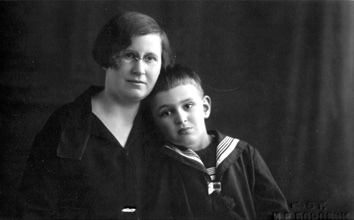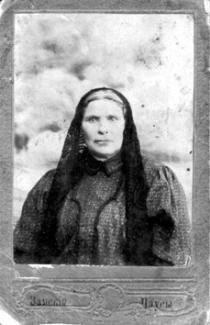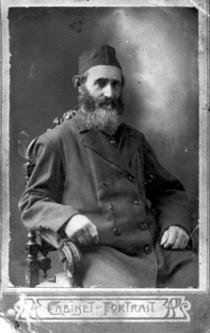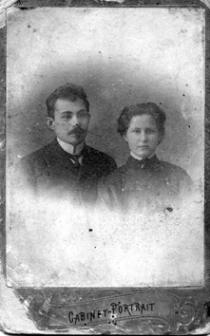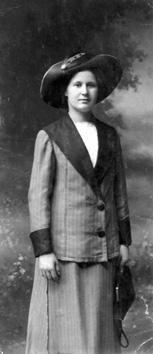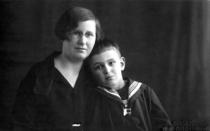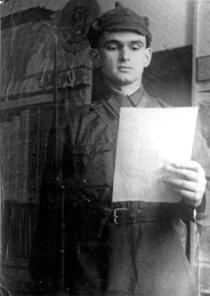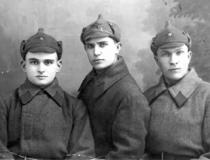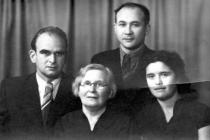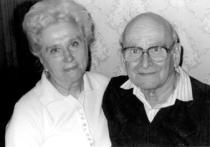This is my mother Rachil Manevich and I, Solomon Manevich. The photo was taken in Kiev in 1924.
My mother was eager to get a good education and become a teacher or a doctor. She left home at the age of 16. Looking for a job she visited few towns in Belarus. Somehow she happened to come to Tomsk, a big town in Siberia, in 1907. She found a job and was an attendant at the pharmacy in the town hospital, then assistant pharmacist and later she became a pharmacist. She didn't attend any school, but she was smart and the doctor she worked for sympathized with her and trained her after work. My mother lived in Tomsk until 1910 and then she began to travel in Russia. She worked in Syzran, a town near the Volga River, Troitsk and few other Russian towns. I don't know where or how she lived at that time. I think she probably rented rooms from various people. At that time she became fond of Bolshevik ideas and attended clubs: there were communist units in every town, but I don't know how she got there. They studied Marx and Engels. My mother didn't become a Bolshevik, but in one of Bolshevik groups she met my father Henry Manevich. They went to the front together in 1914 when WWI began. My mother was the director of pharmacy in the hospital in the Southern front. She worked in Tiflis (the capital of Georgia, Tbilissi at present) and Sverdlovsk. In 1918 she and my father settled down in Ekaterinoslav [Dnepropetrovsk at present, a big industrial town in central part of Ukraine]. My parents were married by that time, but I have no idea when or where they got married or whether they had a wedding of any kind.
I was born in Ekaterinoslav on 29th March 1919. From Ekaterinoslav the family moved to Rostov-on-the-Don and then in Kharkov. All I know is that it had something to do with my father's job. He was a logistics supervisor an official in public economy. My mother's dream of getting education came true in Kharkov. She studied and graduated from the Kharkov University and became a pharmacist. In 1924 we all moved to Kiev. Shortly after we moved, my father left the family. He remarried and left Kiev. It was a tragedy for my mother. She was a very proud woman and never forgave my father. I never saw my father again. My mother refused him to see me. She also refused from my father's money support. She never told me about my father. When I asked her questions about him she only told me negative things. I know that my father was a Deputy director of Berdichev leather factory for some time. From there he was transferred to Commercial representation in Berlin. In 1937 my father and all other employees of the Commercial representation were called to Moscow where they were arrested. He then disappeared like millions of other communists.
We lived in the apartment that my father received in Kiev. I was raised in the international and communist spirit. My mother spoke Russian to me. My mother wanted me to study in Russian school. She believed that it would make it easier for me to enter an institute after finishing Russian secondary school. In 1920s the national policy required every child to go to school of his nationality. Since I was a Jew I was supposed to go to a Jewish school. Before my mother and I went to an interview at the Russian school, my mother told me to pretend I didn't know a word in Yiddish even if interviewers asked me questions in Yiddish.I did as my mother told me and was admitted to a Russian lower 7 year-secondary school. I had many Jewish class and school mates. Many Jewish children wished to study Russian since it was the only way to continue education.
Probably because I grew up without father I developed the feeling of responsibility. I knew that I had to study well and get a good education to go to work and support my mother. I was the youngest pupil at school since I went to school before I turned 7. I was a disciplined and industrious child. I became a pioneer and the ceremony was conducted at the Lenin Museum. It was a big honor, I remember.
